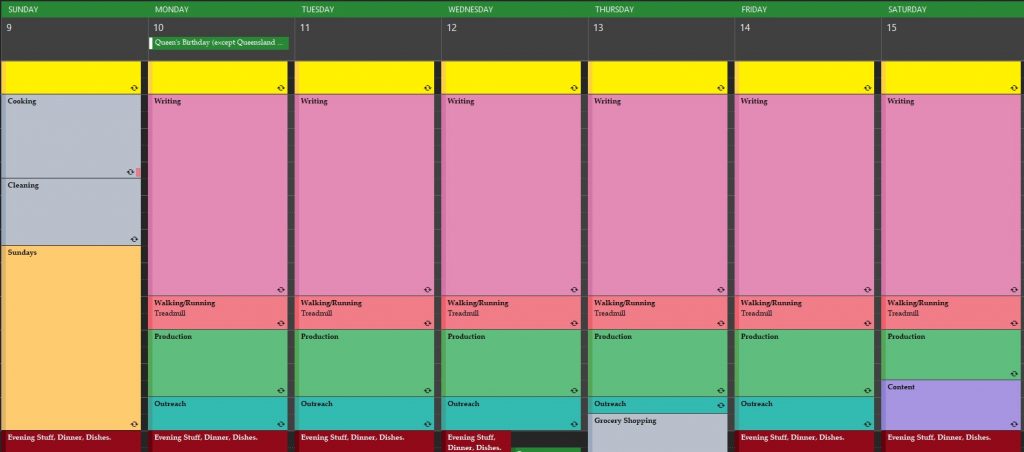
Do you have a fully developed Production Schedule, with release dates for the next year?
Do you still find you’re skipping writing dates, and cramming an entire novel’s worth of writing into ten days before the deadline?
Want to know a way around that?
This was me up until a couple of weeks ago.
The problem, I’ve discovered, is that my writing schedule and my production schedule are:
- Based on averages
- Have built-in wriggle room for disasters, emergencies and other life-rolls.
The production schedule is automated to a degree, so it can’t take into account things like national holidays and family occasions. All it can do it adjust for the much larger issues, like weeks off at a time.
It is impossible to build a useable production schedule without using averages: Your average word-count per hour, the average number of hours you can devote to writing fresh manuscript in a week, and so on.
Averages automatically build in wriggle-room, because they are averages.
You know you write an average of 1,200 words an hour and all your schedules are built upon that number, yet you also know that, when pushed, you can crank out 1,600 words an hour. That knowledge sits in the back of your mind.
Because our brains like to cling to the notion that writing is hard, it’s very easy to get blase about writing today, when you know that with a bit of a push, you can catch up tomorrow and the next day.
But tomorrow comes and you toy with the idea of skipping one more day, and just pushing extra hard to make up later.
Being behind on your writing schedule becomes a constant–it did for me. If you read my work logs going back a few months, you’ll quickly pick up that I was playing a constant game of catch-up.
I may have solved that niggling issue now. I won’t say conclusively that it’s fixed, because I want to see how the next few months pan out. But so far, so good.
What changed it?
It was actually a very simple thing.
I built a day-by-day writing schedule and locked it into my calendar.
I need to explain this a bit more, because I have always added writing time to my calendar. My average calendar week looks like this:

Notice that word again? Average.
For four years of full time writing, this averaged-out schedule of work has sufficed. What I wrote each day during my writing sessions was dictated by my Production Schedule, which has hard release deadlines I’ve never missed…although I’ve scrambled here and there to meet them.
I read a book recently, Get It Done: The 21-Day Mind Hack System to Double Your Productivity and Finish What You Start, by Michael Mackintosh. I wrote about it in “What Plate Will You Spin Next?” last week.
His mind hacks are powerfully motivating, and prompted me to reassess how I was approaching each day of work. The laissez-faire bucket system I use, above, wasn’t quite doing the job, because each morning I found myself in negotiation with my lizard brain, deciding whether I really would write that day, or catch up later.
When I read the book, I was seriously behind my schedule (again). In self-defense, I pulled up my calendar (the one above, but back a few weeks), and for each day’s writing session, wrote down exactly what I would write in that session. It allowed me to figure out precisely how I would catch up with my deadlines, and how long that would take.
It was very literal:
xxdatexxx: 10,000 words of xxx book, using morning session, and clearing decks to write in the PM and Evening
xxdatexxx: 10,000 words of xxx book, using morning session, and clearing decks to write in the PM and Evening
xxdatexxx: 10,000 words of xxx book, using morning session, and clearing decks to write in the PM and Evening
xxdatexxx: Clean up and prep for editing.
xxdatexxx: Plotting xxx book
xxdatexxx: Plotting xxx book
xxdatexxx: Plotting xxx book
xxdatexxx: 8,000 words of xxx book, using morning session and evenings.
xxdatexxx: 8,000 words of xxx book, using morning session and evenings.
And something magical happened.
I could see that in order to meet my closest approaching deadlines, I would have to really floor the pedal for a while, then I could gradually ease off until I was back to my “easy” and “average” daily word count, and still hit all my deadlines.
I could see that for several weeks, I would have to work seven days a week, but later, I could take Sundays off without guilt or pressure…or worry.
Instead of just kicking it up a gear, working my butt off each day and hoping I’d hit my deadline, I could see exactly what it would take to get it done.
And there was a bonus in there, that thrilled me and made me even more determined to make the (admittedly onerous) schedule work: A couple of books down the road, when I looked at my Production Schedule deadlines, and the available writing sessions on my calendar, I found I had a bit of free time. A day or two, here and there.
In the past I considered that sort of time as “wriggle room”, and would goof off until my deadline was screaming at me.
Now I was looking at the spare time, and thinking: Short stories! Anthology submissions! New genre experiments!
In other words, all the “spare time” writing I’ve itched to play with for years, and never quite got around to. These type of writing projects become critical in the long term. They let you experiment and explore new avenues, styles and ideas. They will also allow me to develop a secondary genre and establish new pen names via short stories sold to magazines and other markets.
Short stories and other short, fun projects provide reader magnets, giveaways and other PR-useful products. They give one a break from the “usual” commercial writing.
It’s fun stuff to write, but has serious purpose behind it.
Now I have those spare time projects actually scheduled in. They are rewards for sticking to the exact schedule I’ve built. If I don’t stick to the schedule, then I won’t have the time to do them. It’s self-rewarding to do what I have scheduled.
Intrinsically Motivating.
This precise, day-by-day commitment has inbuilt rewards. Put together with Mackintosh’s mind hacks, in particular, choosing short term pain over long term pain, makes procrastinating about writing when you should almost impossible.
I haven’t blown off a day of writing/plotting since I started planning day-by-day.
It still won’t always work as planned.
You can be as precise and detailed as you want, but it still won’t happen as you plan, for there are unknowns you simply cannot allow for. For example, I’ve hit one this week. I’m writing a novel in a genre that is not as familiar to me as, say, historical romances (I just wrote the last historical romance in seven days). The writing is painfully slow, because I’m considering and second-guessing not quite word-to-word, but definitely beat-to-beat.
It has put me behind even my cast-iron daily schedule.
I’m not beating myself up about this, as I usually do. I consider it an unanticipated snag. Next time, I’m make allowances for the newbie genre speed. This time, I have three options:
a) Put in the extra hours necessary to get the scheduled words down. Or,
b) take the hit upon my scheduled fun projects, my reward projects. Or,
c) Both.
It very much depends upon how many extra words I can squeeze out of my day, as to whether I must give up the upcoming reward days. But now I have powerful reasons to put in the extra hours to get this done. And I’m also motivated to be far more precise and detailed, and realistic about how much I can write, instead of winging it based upon averages.
Give it a try yourself. Let me know how effective very detailed planning works for you.
t.
